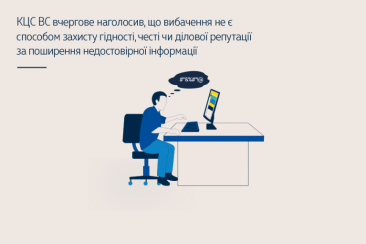Contact center of the Ukrainian Judiciary 044 207-35-46

The Constitution of Ukraine guarantees everyone the right to freedom of thought and speech, free expression of their views and beliefs. The court does not have the right to force the defendant to apologize to the plaintiff in any form, as the law does not provide for forced apology as a means of judicial protection of dignity, honour or business reputation.
The Supreme Court issued this opinion in a panel of judges of the First Judicial Chamber of the Civil Cassation Court.
The plaintiff alleged that the defendant had posted to an open Facebook group a post containing blatantly inaccurate and negative information about him, and that the post contained offensive defamatory comments. The disseminated information became known to a wide audience and negatively affected the plaintiff's business and public reputation. Therefore, he asked the court to recognize the disseminated information as false, untrue and degrading to his honour, dignity and business reputation, to oblige the defendant to publicly apologize and refute the disseminated information in the relevant Facebook group, and to recover UAH 60,000 in non-pecuniary damages.
The courts of previous instances partially granted the claim, acknowledging the information as false and humiliating, ordered the defendant to post a message in the relevant Facebook group, publicly apologizing to the plaintiff and asking that the disseminated information be considered false, and ordered the defendant to pay UAH 20,000 in non-pecuniary damages. The court of appeal agreed with the district court's conclusion and noted that the defendant, in disseminating false information about the plaintiff, used words of objectively offensive content that, by their semantic meaning, cannot be attributed to those used in a language acceptable for communication in society, so there are no grounds to consider them value judgments, as the plaintiff unreasonably stated in his appeal.
The Civil Cassation Court of the Supreme Court overturned previous decisions and dismissed the lawsuit regarding claims for recognition of false information and refutation of disseminated information, ordered the defendant to pay UAH 10,000 in non-pecuniary damages for offensive statements, and made the following legal conclusions.
The context of all the information disseminated about the plaintiff shows that the information disseminated did not contain undisputed statements of reliable factual data, but was based on information containing value judgments and criticism of the plaintiff's personality and actions.
According to Article 277 of the Civil Code of Ukraine, value judgments are not subject to judicial protection. The court should distinguish between facts and value judgments. Facts can be proven, but value judgments cannot. As far as value judgments are concerned, this requirement is impossible to meet and constitutes a violation of freedom of expression itself, which is a fundamental component of the right guaranteed by Article 10 of the Convention for the Protection of Human Rights and Fundamental Freedoms (judgment of the European Court of Human Rights in Lingens v. Austria).
The defendant did not disseminate information about a fact, and the information disputed by the plaintiff is essentially a value judgment of the defendant, which in turn contains offensive statements about the plaintiff's personality.
At the same time, opinions expressed through linguistic means, especially the use of hyperbole, allegory, satire, and brutal form, cannot be refuted.
If a subjective opinion is expressed in a brutal, humiliating or obscene manner that degrades dignity, honour or business reputation, the person who expressed the opinion or assessment in such a manner may be liable to compensate for the moral damage caused.
The conclusions of the courts of previous instances on refuting false information by posting a public apology on the group's Facebook page are erroneous.
Part 1 of Article 34 of the Constitution of Ukraine guarantees everyone the right to freedom of thought and speech, to the free expression of their views and beliefs. The court does not have the right to force the defendant to apologize to the plaintiff in any form, since forced apology as a means of judicial protection of dignity, honour or business reputation for the dissemination of false information is not provided for in Articles 16 and 277 of the Civil Code of Ukraine.
This is in line with the case law of the European Court of Human Rights in its judgment of May 25, 2011 (application no. 33014/05) in the case of the Editorial Board of Pravoye Delo and Shtekel v. Ukraine.
The Resolution of the Supreme Court of March 13, 2024 in case No. 712/10999/22 (proceedings No. 61-13517св23) - https://reyestr.court.gov.ua/Review/117788727.
This and other legal positions of the Supreme Court can be found in the Database of Legal Positions of the Supreme Court - https://lpd.court.gov.ua.